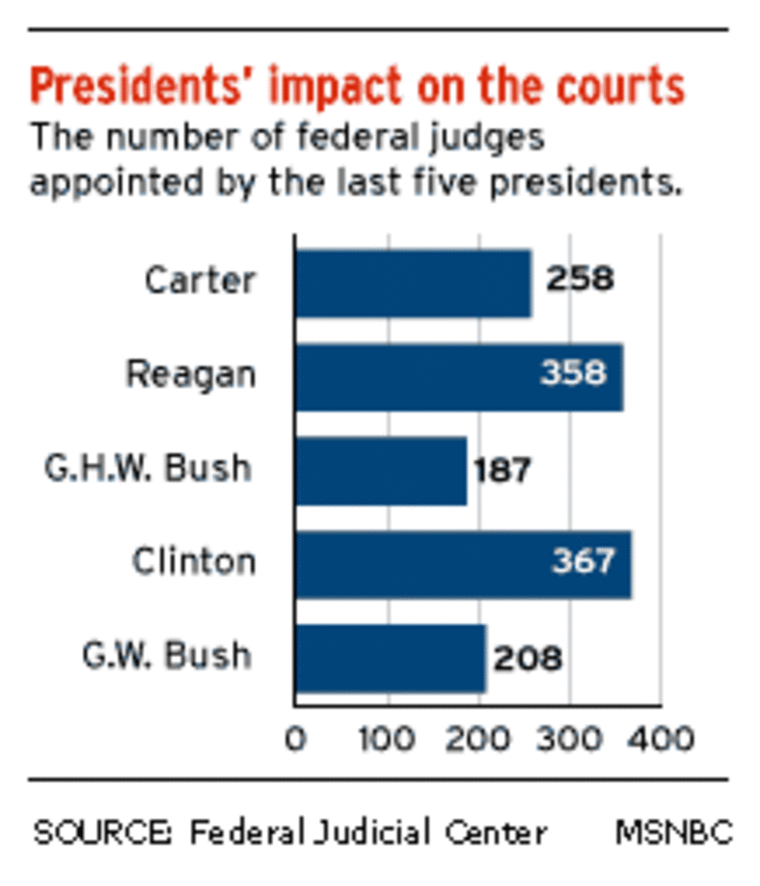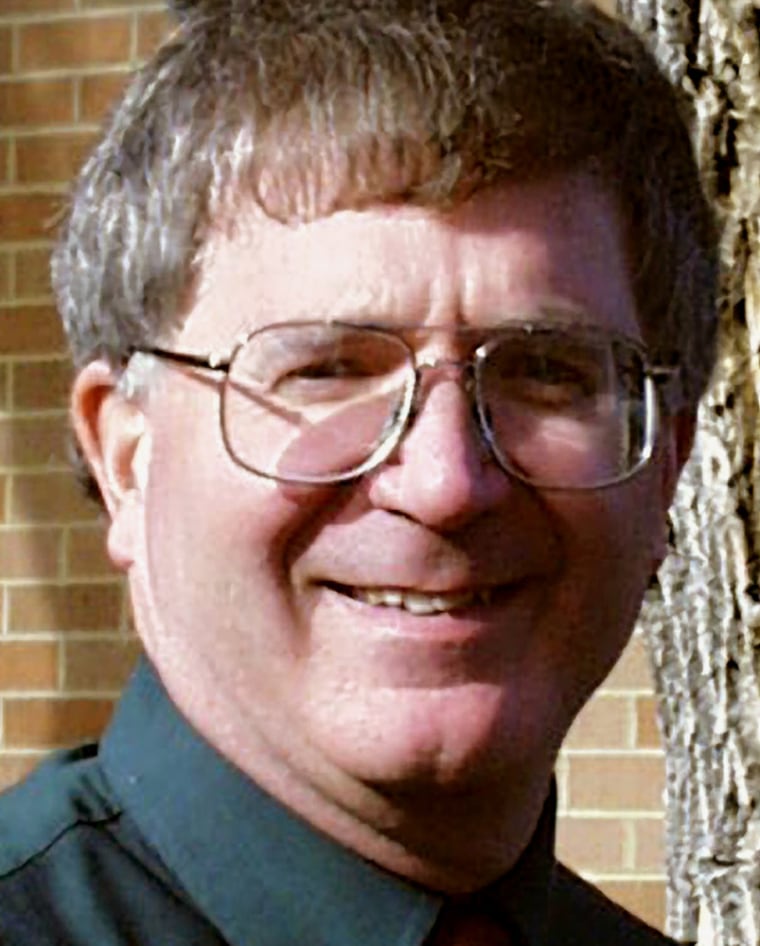The Federalist Society, an organization of 35,000 lawyers and the conservative-libertarian breeding ground for several of President Bush’s judicial nominees, gathered in Washington over the weekend for its annual meeting.
In the ballroom and corridors of the Mayflower Hotel on Friday and Saturday, one could see not only conservative luminaries such as former independent counsel Kenneth Starr, but a present Supreme Court justice, Antonin Scalia, and quite likely one or two future justices as well.
Addressing or presiding at Federalist Society panel discussions on issues ranging from gay rights to labor law were such conservative stars as Judge Michael McConnell of the Tenth Circuit Court of Appeals — a man some see as headed to the high court — and Judge William Pryor of the Eleventh Circuit, whom Bush placed on the bench with a recess appointment after Democratic senators blocked a vote on his nomination with a filibuster.
Right now, 201 federal judges appointed by Bush and confirmed by the Senate are serving on the federal bench.
With Bush about to begin his second term and with ten of his nominees stopped by Democratic filibusters, a keen sense of anticipation is building in right-wing ranks. The defeat of Senate Minority Leader Tom Daschle in his South Dakota race has given conservatives hope that better days are ahead.
Focus on Senate confirmation
“It’s very clear to me that the issue of judicial confirmations and the role of the courts were more important issues in this election than perhaps they had ever been,” said Leonard Leo, executive vice president of the Federalist Society, as he took a break from the group’s panel discussions. “I do think the people are watching very carefully how the Senate addresses the issue of judicial selection and confirmation.”
Leo added the Republicans’ net gain of four Senate seats means “the Senate Democrats could decide the (filibuster) strategy is no longer useful.”
But “it is also quite possible that if they do not cease and desist from filibuster tactics, Republicans in the Senate could potentially muster enough votes for either a rules change or a point-of-order motion, both of which would only require a majority vote to change the misuse of the filibuster.”

Many Reagan and Bush appointees to the federal bench have come from Federalist Society ranks, but Leo said, “We’re not as an institution consulted about judicial selections, we don’t advance particular candidates for federal judicial office, we don’t support or oppose nominees, and we don’t directly lobby on the Hill for a nominee.”
Members of the Federalist Society generally favor an “originalist” approach to interpreting the Constitution, meaning that judges should closely hew to the text of the Constitution and heed the expressed intentions of those who wrote it.
A clear case of a non-originalist Supreme Court decision: the 1973 Roe v Wade abortion ruling. "There was no right to an abortion when the Fourteenth Amendment was adopted; in 1973, all 50 states had laws outlawing abortion on the books; the court came along and changed the laws of all 50 states," said Northwestern University law professor Steven Calabresi, who once served as a law clerk for Justice Scalia and for Judge Robert Bork. Calabresi is the chairman of the Federalist Society.
Lesson of Bork's defeat
An originalist approach is one of the things that led Bork to defeat in the Senate in 1987 when Ronald Reagan nominated him to serve on the Supreme Court.
Senate Republicans will be reminded of that defeat when they meet Tuesday to discuss whether to approve Sen. Arlen Specter as the new chairman of the Judiciary Committee, which conducts confirmation hearings for judicial nominees.
Specter voted against Bork's confirmation, a black mark in conservatives' books and one reason some are seeking to prevent him from ascending to the chairmanship.
Prior to his nomination, Bork told a Federalist society meeting in 1987 that an originalist judge “would have no problem whatever” in over-ruling a non-originalist precedent because that precedent “has no legitimacy.”
Now originalism may be on the brink of historic success.
In the next four years Bush may have the chance to nominate perhaps as many as four Supreme Court justices. But even the most conservative Republican presidents have seen their appointees to the Supreme Court, once confirmed and on the court with life tenure, turn out to be part-time or full-time members of the court’s liberal coalition.
Richard Nixon’s 1970 appointee Harry Blackmun, who wrote Roe v. Wade, is the most famous case in point. But Blackmun was not alone:
- Nixon appointee Chief Justice Warren Burger wrote the court’s unanimous opinion in the 1971 case, Griggs vs. Duke Power, which ruled that even if an employer did not intend to discriminate against job applicants on the basis of race, if he used a hiring test or requirement which had a greater impact on members of one ethnic group than on members of another, that employer violated federal law. Conservatives want to see this “disparate impact” rule overturned.
- David Souter, appointed by the first President Bush in 1990, has joined liberal justices in voting to uphold Roe v. Wade, in sustaining gay rights and in opposing the death penalty.
- Reagan appointee Anthony Kennedy wrote the court’s decision in Lawrence v. Texas, the 2001 case that propounds the idea that the Constitution demands respect for gays and lesbians to seek “autonomy” for their choices about marriage, family relationships, and child rearing. While not an outright legalization of same-sex marriage, Kennedy’s decision looked much like a precursor to legalization.
With a vacancy impending and with many appeals court slots to fill over the next four years, Bush is poised to set the judiciary on a course away from Blackmun and Souter and toward two justices for whom the president has expressed admiration, Scalia and Clarence Thomas.
Bush appears to share the Federalist Society view of the need for an originalist approach to deciding cases.
One thing that made the originalist view disreputable to its critics and a shade embarrassing to its proponents was the fact that the one landmark Supreme Court decision that almost all Americans now agree was morally right and necessary, the 1954 Brown v. Board of Education ruling outlawing racial segregation in public schools, was not an originalist decision.
In 1954 Chief Justice Earl Warren persuaded his fellow justices that the time had come for the court to take the lead in banning racial segregation, using as justification the Fourteenth Amendment’s command that no person can be denied “the equal protection of the laws.”
For originalists, there was one problem: it was by no means clear that the authors of the Fourteenth Amendment, which was ratified in 1868, intended to outlaw racial segregation in public schools.
After all, at the time the amendment was adopted and after, the public schools in the District of Columbia, under the direct control of Congress, were racially segregated. Even the Senate gallery was racially segregated in 1868, as Ethan Bronner points out in his book about the Bork confirmation hearings.
On Saturday, in what seemed an attempt to dispel any taint on the originalist approach, Judge McConnell gave the Federalist Society his analysis of why Brown was, in fact, justified on originalist grounds.
McConnell said the court in Brown “rested its decision essentially on the authority of modern social science evidence” about the damage done to black children by segregation.
Brown was, McConnell said, “the first and most conspicuous example of a decision which one wants to applaud, but which plainly did not rest on an analysis based on the original meaning of the text” of the Constitution.
But using evidence from the 1860s and 1870s, McConnell argued that if the Warren Court had more clearly understood the authors of the Fourteenth Amendment, it would have found considerable evidence of their original intent: outlawing segregation in public schools, hotels, theaters and other public places.
A large majority in Congress at the time the Fourteenth Amendment was passed, he said, also supported laws desegregating schools because they believed segregated schools violated the Fourteenth Amendment. They were stopped by a Democratic filibuster and by the Democratic sweep in the 1874 elections. The Democrats supported racial segregation.
Two legal scholars on the panel with McConnell, Earl Maltz of Rutgers School of Law and Michael Klarman of the University of Virginia Law School, disagreed with his reading of the history.
Was this all a dry scholarly debate about events which took place 136 years ago? Not at all.
If, as some conservative court watchers hope, Bush nominates McConnell and other originalists to the Supreme Court, they would be pressed to defend the originalist approach. McConnell gave every evidence of being well armed for any battle ahead.
If Bush does nominate McConnell to the high court, he’ll feel a sense of déjà vu. In 1987, McConnell testified to the Senate Judiciary Committee on Bork’s behalf.
McConnell told Sen. Edward Kennedy, D- Mass., “These charges that some people with the politicized portion of the legal community are making” against Bork, “are so extreme, so outlandish and so obviously partisan and political.”
